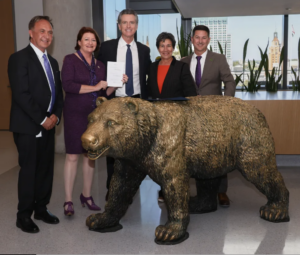The fact that California has officially ended its publicly funded travel ban to states with laws that discriminate against LGBTQ+ people is good news for all venues in those states, particularly meetings and sports venues. The actual impact of the 2016 legislation had been supplanted already by COVID-19, post-COVID policies and other state’s legislative action, but nevertheless, it opened the gates to some prospecting that had been on hold for years.
Governor Gavin Newsom signed California’s Senate Bill 447, known as the BRIDGE Project, Sept. 13. It repeals the 2016 law that banned state-sponsored travel to as many as 26 states, the number reported to discriminate on the basis of “sexual orientation, gender identity or gender expression” per the American Civil Liberties Union.

Governor Newsom alongside Assemblymember Zbur, Pro Tem Atkins, Senator Eggman and Assemblymember Ward for SB 447 signing (left to right.)
Seven years ago, North Carolina venues were hit hard by California’s ban because of their own state’s HB2, dubbed the “bathroom bill” but officially the Public Facilities Privacy & Security Act, which, among other mandates, compelled schools and state and local government facilities containing single-gender bathrooms to limit access to people of the corresponding sex as listed on their birth certificate.
When that 2016 bill was signed into law by N.C. Governor Pat McCrory, the sales team at the Raleigh Convention Center took a hit. Mara Craft, currently director of sales there, remembers: “Honestly, it was a midnight session. I remember our former director of sales texted me at 11 P.M. saying, ‘This is not going to be good.’ That morning it’s like our emails and phones had exploded.”
“It was hard that first year. Even if you traveled, we had a rule you couldn’t travel alone, because there were folks that would take it out on us, sales people or service people, because they were so — rightly so — upset about it. Then other states made poor decisions, and it became less and less prominent. That [HB2] law sunsetted, but people just don’t know that.”
Kerry Painter, CVE, CEM, CMP, director of the Raleigh complex, summarized the impact of California’s new legislation succinctly: “If you were still leery or holding a grudge, it takes it away.”
There is a list of HB2 groups who would not consider Raleigh until California and other boycotts go away, “and we will add them back into our prospecting list. A lot of them are in D.C., so the CVB and our team have already started reaching out to them,” Craft said.
The impact of COVID overshadowed any boycotting that was obvious, she added, but there were still associations “we would chat with that would say, ‘Oh, we have a big California contingency that wouldn’t be able to travel there.’ Typically, that happened in higher ed or government.”
Timing is coincidentally great for arenas hosting sports, and North Carolina hosts more than its fair share of college sports tournaments. With Stanford and Cal joining the ACC in 2024, it’s even more apropos.
Pressure from sports organizations, like the ACC, had a lot to do with dropping the original HB2, Craft noted, adding that they were lucky that Raleigh is a progressive city and had other legislation and ordinances that protected them. Still, the state as a whole was looked on unfavorably, which hurt places like Greensboro Coliseum Complex early on.
Scott Johnson, deputy director in Greensboro, recalled the venue lost a whole year of NCAA tournaments when HB2 and the resulting boycotts hit. When the bill was repealed, most of Greensboro’s youth sports and college basketball came back.
“Every state had a different rule or different tolerance for what they would accept. North Carolina took the brunt of it for awhile,” Johnson said.
Even with business back, Gov. Newsom’s move is “symbolically a good move,” Johnson said.
Not only did Greensboro lose NCAA events the year of HB2, they lost the next scheduled series in 2020 because of COVID.
“We just had a 2022 Women’s Regional and 2023 Men’s First and Second round, and it all went flawlessly. There were no problems from any states,” Johnson said.
California’s new law, which is effective immediately, replaces the travel prohibition with an outreach campaign that encourages LGBTQ acceptance and inclusivity.
“In the face of a rising tide of anti-LGBTQ+ hate, this measure helps California’s message of acceptance, equality, and hope reach the places where it is most needed,” Newsom said in a news release.
